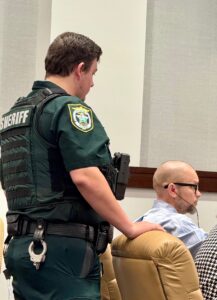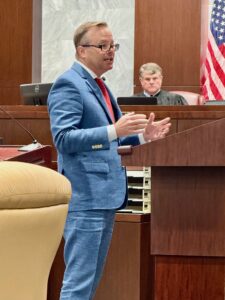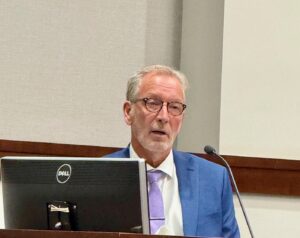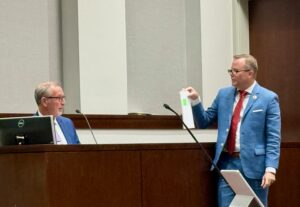

A man who completed his 25-year-sentence for a series of rapes in 1998 and 1999 was deemed a sexually violent predator by a jury in a civil trial Wednesday evening and ordered to remain in custody at Florida’s treatment facility for sex offenders who pose an ongoing risk to the community, State Attorney Larry Basford announced.
Bobby Allen, 53, broke into four homes during a “cluster” of attacks in December 1998 and January 1999 in the Springfield area, committing three sexual batteries and attempting a fourth. There were similarities in each case, including the suspect wearing black clothes and a mask, and being armed with a knife. Although the suspect made the victims “clean” themselves, one managed to hide DNA evidence after the attack.
In 2002, as DNA technology developed, the sample captured by the victim in the Jan. 19, 1999, attack was matched to Allen and he was arrested. The technology progressed rapidly and the defendant’s DNA was also tied to the December, 1998, sexual battery of a 15-year-old. In 2007, Allen was castrated and entered a plea in the cases, receiving a 25-year sentence to be followed by 10 years’ probation.
As the end of his sentence approached, Basford had Prosecutor Zachary Taylor file to have Allen committed to a secure treatment facility under the Jimmy Ryce Act. It is a civil proceeding to prevent sexually violent predators from re-entering society if the state believes they pose a continued danger, aiming to protect the public through civil confinement.

“I’m very thankful to the jury who sat and listened to very difficult material,” said Taylor, who specializes in prosecuting Ryce cases. “They made a very wise decision based on the law. Mr. Basford’s office is committed to prosecuting to the fullest extent of the law these individuals who harm children. Our community is safer today with Bobby Allen in confinement.”
In Allen’s case, Taylor called witnesses and presented evidence to jurors showing the defendant went to prison four times, including when he was 18 for a sex offense. He was released on probation but violated it on another sex-related offense and was sent back to prison. He did a third prison term for non-sex related crimes. He was released in October, 1998, and committed the first sexual battery two months later.
An Evaluation for the Involuntary Civil Commitment of Sexually Violent Predators conducted by Dr. Gregory Prichard concluded the defendant was at an “above average” risk of reoffending. Out of the 7 people who tested or evaluated the defendant, 6 agreed with Prichard’s findings. The castration, he said, while stemming the flow of testosterone that drives sexual desires and anger, can be nullified by testosterone replacement. And it was noted the defendant participated in that for a time while incarcerated.


Prichard also agreed with Taylor that these types of crimes are driven as much by psychology as by sexual urges or feelings.
“It’s his belief in his head as part of the distorted thinking that one of these women he’s attacking is going to like it and could become his girlfriend,” Prichard said. “He is not the casual, usual sex offender, he is in the above average range of being likely to reoffend.”
Taylor told jurors that the defendant’s history speaks for itself, and the testing and evaluations support that the chances it could happen again are too high for the public to be put at risk until the defendant is properly treated.
“Every time he has been out of prison or on probation, he has failed spectacularly,” said Taylor, who noted that the defendant has spent 31 of his 35 adult years in prison. “There might be a day in the future where he can be safely out in the public, but that day is not today.”
The jury deliberated for 30 minutes. Circuit Court Judge Brantley Clark ordered the defendant taken to the Florida Civil Commitment Center for an indefinite period.
Basford thanked Prichard and others who were dealing with cases that occurred over 25 years ago.
For more information, contact Mike Cazalas at mike.cazalas@sa14.fl.gov, or call 850-381-7454.
